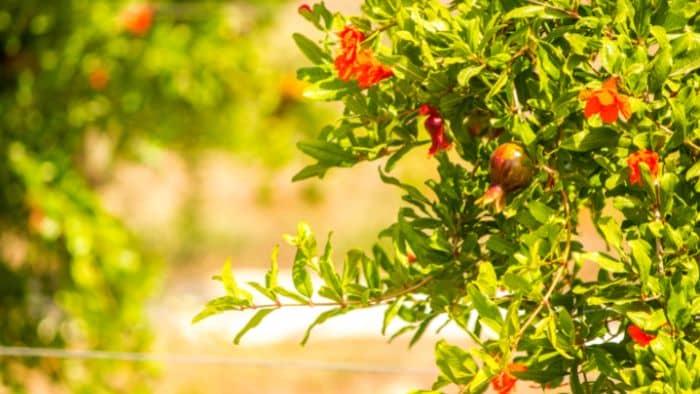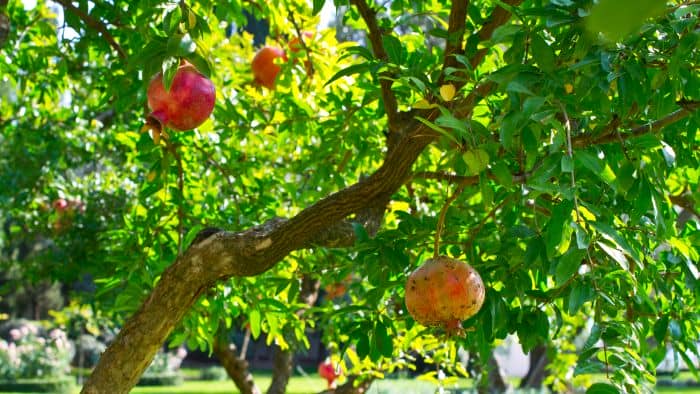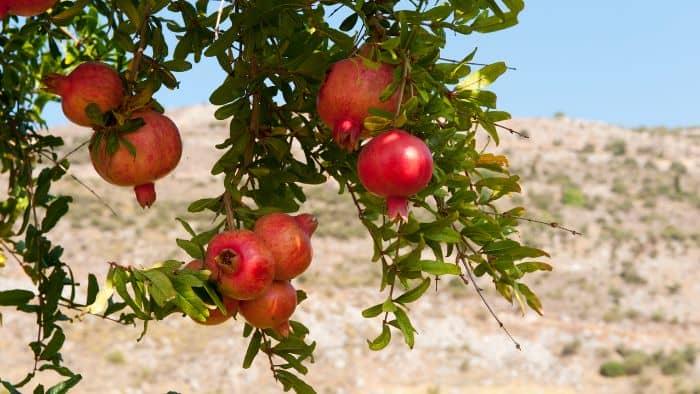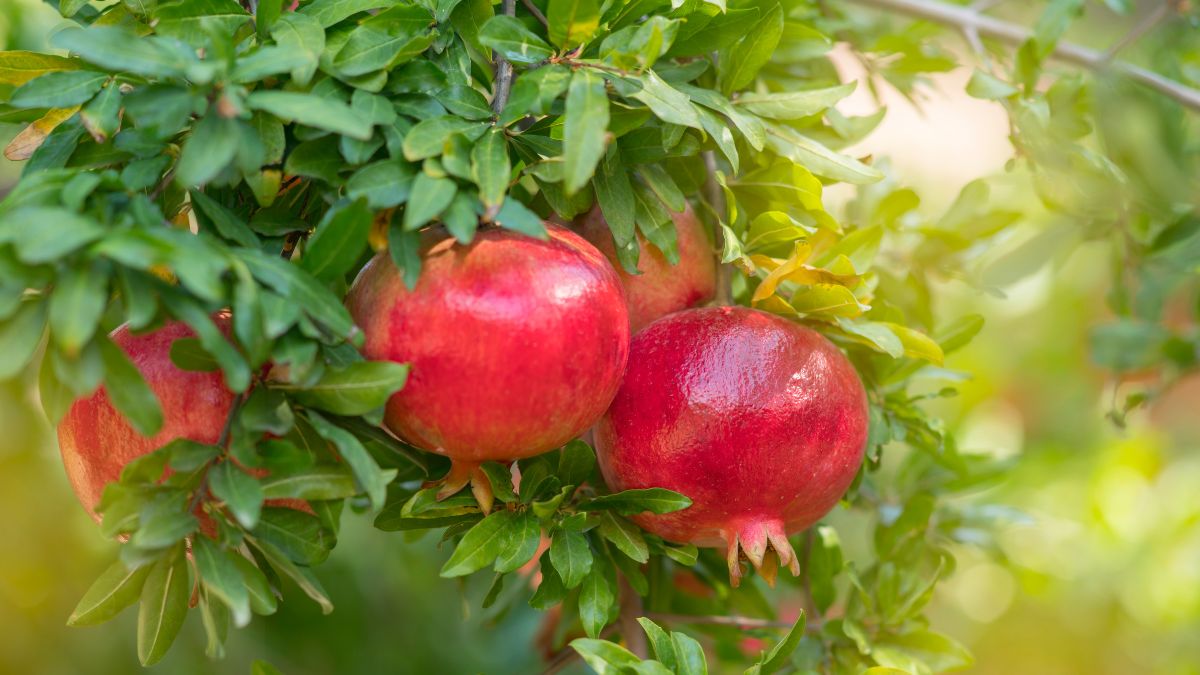Using the Best Soil for a Pomegranate Tree will ensure that you get a good healthy crop. This plant has many health benefits and once it bears, it will enhance the beauty of your garden.
Pomegranate Trees originated from the Himalayas in east Asia. It has now become very popular in most parts of the world because of its use in a variety of food dishes. The first tree was brought to California in the year 1769 by a group of Spanish settlers.
These hardy trees have a lifespan of over 200 years provided they are planted in the right conditions. This can be a legacy for generations to come if it is properly maintained. In this blog post, we give you information on growing a pomegranate tree successfully and much more. Read on for more information on growing these beneficial trees in your garden.
Things To Consider When Growing Pomegranate Trees

When growing pomegranate trees, it is important to take a few things into consideration. These trees grow well in sub-tropical areas and can adapt to warm summers or cool winters; however, very cold weather can damage them. There are many different varieties of pomegranate plants to choose from. As each has its own growing conditions, it will be wise to consider which type is best for your region.
One of the most important facts to consider is to use the best soil when planting a tree. This will ensure that your tree bears fruit for many years to come. The wait may sometimes be longer but it will eventually come to pass. Planting them in warmer weather is best as they like hot and dry conditions.
When planting, select a spot where there is direct sunlight. This plant needs a minimum of 6 to 8 hours of sunlight per day. Soil drainage should also be good as it is a hardy plant that does not like too much water; however, for the first few months, it will need to be watered more often in order to establish itself.
This plant is not prone to diseases easily and is a great addition to any garden. Watch this video for a full guide on growing and pruning pomegranate trees.
What Is The Best Soil For A Pomegranate Tree?
This plant can easily adapt to most soil types, however, for optimum results, the best soil for a pomegranate tree is rich in nutrients and organic matter. We, therefore, recommend that you use soil with a ph of 5.5 to 6.5 which is acidic.
Too much moisture in the soil will damage the roots causing the plant to rot and eventually die. Same as citrus, these are also excellent landscaping plants. Once your plant has established itself and is 3 years and older, it will be able to withstand drought if planted in the best soil.
For commercial use, growing pomegranate in pits with light texture soil can bring you a great yield. Research shows that if grown in deep clay soil at about 60 cm or so, it can produce a large harvest. If it is planted too deep, it can easily contact unwanted diseases which will affect your yield substantially.
Steps To Plant A Pomegranate Tree
Pomegranate trees are hardy plants. Growing them in the best soil with enough sunlight and proper drainage will ensure a good yield. Now that you have decided which variety you are going to grow, let us show you a few steps to plant this bountiful fruit tree.

Planting From Cuttings:
- For cuttings, dig a wide hole in the ground that is about 60 cm deep. Loosen the soil properly before planting.
- Place your cutting into the hole vertically.
- Thereafter, plant them at least 15cm into the ground.
- If you are growing it as a shrub to create a fence or border, use the dwarf Nana pomegranate tree. It grows to approximately 3 feet, however, it does not produce the best fruit to eat.
- Once you are done planting your trees, water them at the base. If it is extremely hot, you can water them twice a day until they are established.
- Remember to reduce watering once the plant is properly established.
What Are The Benefits Of Growing Pomegranates?
Using the best soil will ensure that your tree grows healthy and happy bearing good edible fruit. They are high in oxidants and consuming the fruit or its juice has countless benefits that can help to improve your overall health. Listed below are a few benefits that you should take note of.

Health Benefits:
- Inflammation – Due to stress, bad eating habits, and an unhealthy lifestyle, our body can develop inflammation that can easily turn into diseases. Consuming pomegranate juice can help reduce inflammation in the body.
- Cancer – Pomegranate juice is excellent for cancer patients. Studies have shown that it has the ability to slow down the growth of certain cancer cells.
- Heart Disease – Consuming pomegranate juice may help to regulate blood pressure and prevent high cholesterol levels that easily lead to heart problems.
- Arthritis – This fruit may reduce the joint pains caused by arthritis and rheumatoid arthritis as it helps reduce inflammation.
- Fertility – PCOS symptoms are known to be a common cause of fertility problems. Eating this fruit can help improve the symptoms.
- Brain – Recent studies show that consuming pomegranate juice is highly beneficial for brain health.
- Ageing – Antioxidants are excellent for fighting the free radicals that cause damage to the skin cells. Since this fruit is loaded with antioxidants its extract is often used in cosmetics to slow down the aging process by rejuvenating collagen.
As a precaution, we recommend that if you are on chronic medication, check with your doctor before consuming pomegranate as this can interact with some medicines.
Conclusion

Pomegranate trees are not only decorative for your garden, but it also comes with an abundance of benefits. Many health issues can be managed when consuming a healthy diet and adding pomegranates to various meals will be an added benefit.
Keep in mind that natural remedies have the potential to work wonders and are chemical-free. Having a healthy and happy pomegranate tree in your garden, although having to wait for it to bear fruit can be truly rewarding. The fruit can be stored for up to 3 months in a cool place if you have an abundant harvest.
Keep in mind to get an abundance of fruit you should consider the type of plant you’re growing, the climate in your region, and the soil. Pomegranate trees planted in acidic soil are recommended to enable them to reach their full potential. Click here for more information on Pomegranate Trees.
FAQs
[rank_math_rich_snippet id=”s-81ab9c7f-062d-455a-8ac7-8806504ba2a7″]

